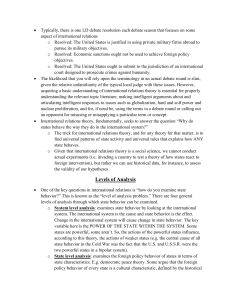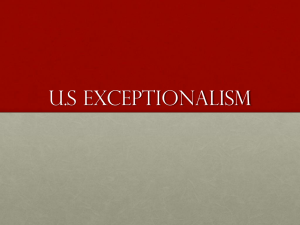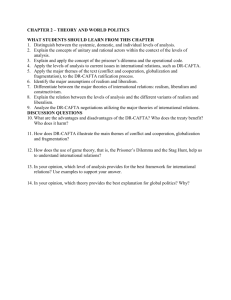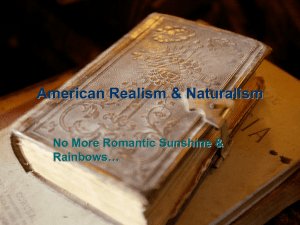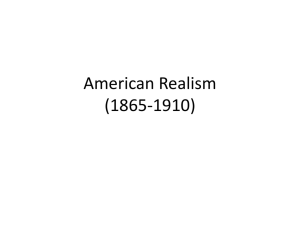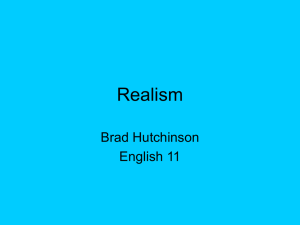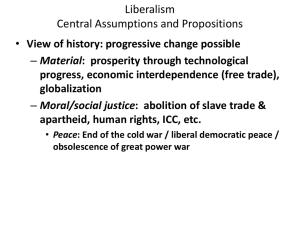Theories of American Foreign Policy and American exceptionalism
advertisement
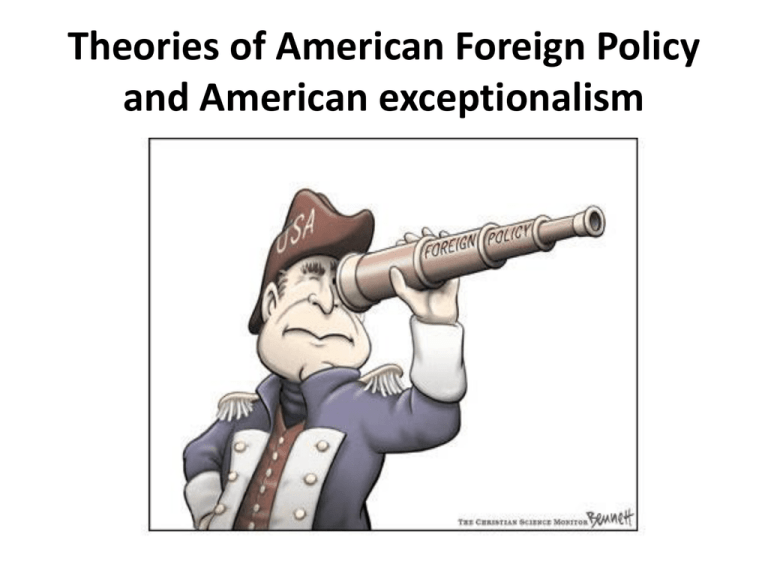
Theories of American Foreign Policy and American exceptionalism Explaining American foreign policy • Task is infinitively complex. • Many diverse factors at play that it often difficult to determine the underlying reason. • As a result of this complexity, need to adopt theory, which tell us what to focus on and what to ignore. • No overarching theory to capture variety sources of American foreign policy. • J.N.Rosenau’s (1971) insightful attempt to develop a (pre)-theoretical framework for identifying the main sources of (American) foreign policy as a good starting point. 5 potential sources that influence a state’s foreign policy ( Rosenau,1971) 1.The External/Systemic Sources • Events taking place in the realm of international politics could profoundly impact the US (i.e. 9/11, China’s rise , Arab “Spring”, proliferation of nuclear/chemical weapons) • On any given day numerous developments take place in the external realm that the US ,as the sole hegemon, needs to respond. 2.Societal (Domestic) Sources • The non-governmental aspects of a country’s society. • The national character and value orientation • Foreign policy reflects and seeks to promote the core values (i.e.liberty) and ideology (i.e. manifest destiny) of the domestic system. • Desire to promote this ideology around the world (i.e. war in Iraq). George W.Bush (May 1,2003) • “…We have fought for the cause of liberty and for the peace of the world. Our nation and our coalition are proud of this accomplishment, yet it is you, the members of the United States military, who achieved it... Because of you, our nation is more secure. Because of you, the tyrant has fallen and Iraq is free.” 3.Governmental Structure • The Constitutional separation and division of power between the executive and legislative. • “An invitation to struggle” • Number of governmental and non-governmental actors (i.e. lobby groups in shaping/making foreign policy.) 4.Bureaucratic roles • The characteristics of the bureaucratic organization • “Role Theory” : a person’s influence is circumscribed by the policy-making roles they occupy. • “ Where you stand depends on where you sit.” 5.Personalities of individuals • Investigating the characteristics of policy-makers, particularly the President. • Individuals’ personality, past experiences, upbringing, personal convictions – matter greatly. • Highlighting the personality traits and beliefs of the President. Theories of American Foreign Policy • Want to know which of Rosenau’s sources is more important than the others. • Good description not enough, parsimonious foreign policy theory with an explanatory power. • Intense debate ( i.e. external vs. internal factors) to determine the most important source(s) of a state’s external behavior & explain what states try to achieve in the external realm and when they try to achieve it. One US Foreign Policy, Many Theories 1.Systemic Theories (Defensive Realism, Offensive realism) 2.Internal, domestic theories (Liberalism, Marxism) 3.Toward a synthesis: neoclassical realism 4. Constructivism 1.Systemic (Foreign Policy) Theories • The most important influence is the international system and specifically the international distribution of power (i.e. unipolar , bi-polar, multi-polar) • Defensive/Offensive realism stress upon systemic pressures play a decisive role. • Both assume that 1) Anarchy 2) Sovereign states 3)SelfHelp 4) Power as the main currency. • For both it truism to state that “capabilities (power) largely determine interests.” 1.1.Defensive Realism • States are fundamentally security maximizers. • In order to ensure survival in anarchical environment, the US seeks an appropriate amount of power, not more. • Expansionist/aggressive policies are counterproductive due to counterbalancing (i.e.SCO ). • If any other state over-expands, the domestic level is to blame. • Considering the US is extraordinarly secure, neo-isolationists is firmly anchored to the theory of defensive realism. 1.2.Offensive Realism • Rather than security maximizers, states are power maximizers. • The best way to ensure survival is to be the most powerful state in the system. • Global hegemony is the highest goal, but not possible due to “ stopping power of the water.” • Favor an “ offshore balancing” grand strategy. • Primacy as grand strategy position derives from this approach. 2.Internal, domestic theories • De-emphasize the utility of system-level explanations • Reversing the chain of causation from an outside-in explanation to an inside-out explanation. • Pressures within a states ( elections, public opinion polls, the domestic economy, unemployment level, etc.) determine foreign policy outcome. 2.1. Liberalism • Given that the US is a liberal state, liberalism is one of the most prominent theories to explain its foreign policy. • The logic of liberalism dictate the US to reflect/magnify the liberal democratic character of the American polity. • Beneficial for the US to have many likeminded liberal states around the world. • Even though they agree on reflecting domestic political values, disagreement on the best way. 3 Main Pillars of a liberal theory of American Foreign Policy 1. Democracy Promotion (i.e.USAID) 2. The Promotion of Free Trade (i.e.WTO) 3. International Institutions (i.e.UN) 2.2.Marxism • Another inside-out explanation • Emphasize the economic determinant, the capitalist economy of the US pressuring on an expansionist and imperialistic foreign policy. • The interests of the capitalist class and the large corporations. • Promotion of the interests of the capitalist class by providing a stable international environment for the expansion of capitalism ( i.e. Open Door policy). • Domestic needs of the American economy for markets and cheap sources of raw material, such as oil. 3.Neoclassical realism • Combine systemic and domestic factors. • Look at interaction of systemic and domestic factors. • Both individual decision makers and domestic politics, including the governmental structure, matter in understanding the foreign policy. 4.Constructivism • The role of ideas and identity • Identities and national interests are all socially constructed • Identity is never self-referential, but rather is always relational and emerges by differentiating oneself from others (i.e. evil USSR , axis of evil). • Interests not a function of material gains, but identities/perceptions/ideas. • Keen interest in explaining change. American Exceptionalism …And I would rather disagree with a case he [Obama] made on American exceptionalism, stating that the United States’ policy is “what makes America different. It’s what makes us exceptional.” It is extremely dangerous to encourage people to see themselves as exceptional, whatever the motivation…We are all different, but when we ask for the Lord’s blessings, we must not forget that God created us equal. (Vladimir Putin, NYT, 11.09.2013) American exceptionalism-1 • Since its founding, the US has thought of itself as , and been widely perceived to be exceptional. • Success makes the US different, but the core reason for its expectionalism is its intensely liberal character. • Indeed, we find this notion of “ American exceptionalism” throughout US history. American exceptionalism-2 “ Trusted with the destinies of this solitary republic of the world, the only monument of human rights, and the sole depository of the sacred fire of freedom and self-government, from hence it is to be lighted up in other regions of the earth, if other regions of the earth shall ever become susceptible of its benign influence.” ( Thomas Jefferson) American exceptionalism-3 American exceptionalism was tied to the idea of Manisfest Destiny, a term used in the 1840s to promote the acquisition of much of what is now the Western United States (the Oregon Territory, the Texas Annexation, and the Mexican Cession of California and New Mexico and adjacent areas). American Progress (John Gast,1872) • The claim that the US is exceptional is highly charged with contentious ideological connotations. • In contemporary word politics, it means very different things to different people. For some it is a vision, for others a nightmare. …disagree with a case he [Obama] made on American exceptionalism, stating that the United States’ policy is “what makes America different. It’s what makes us exceptional.” It is extremely dangerous to encourage people to see themselves as exceptional, whatever the motivation…We are all different, but when we ask for the Lord’s blessings, we must not forget that God created us equal. (Vladimir Putin, NYT, 11.09.2013) Thanks
